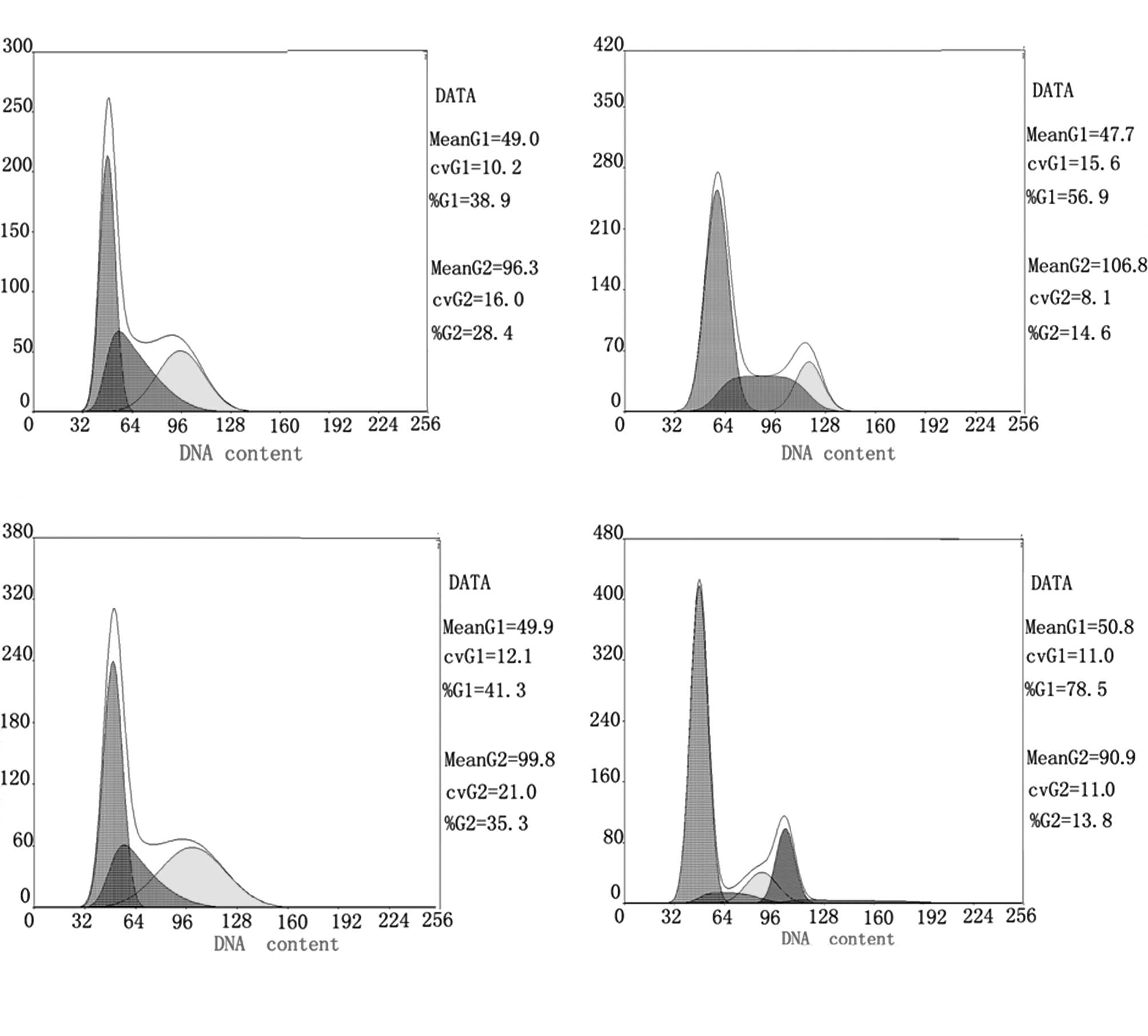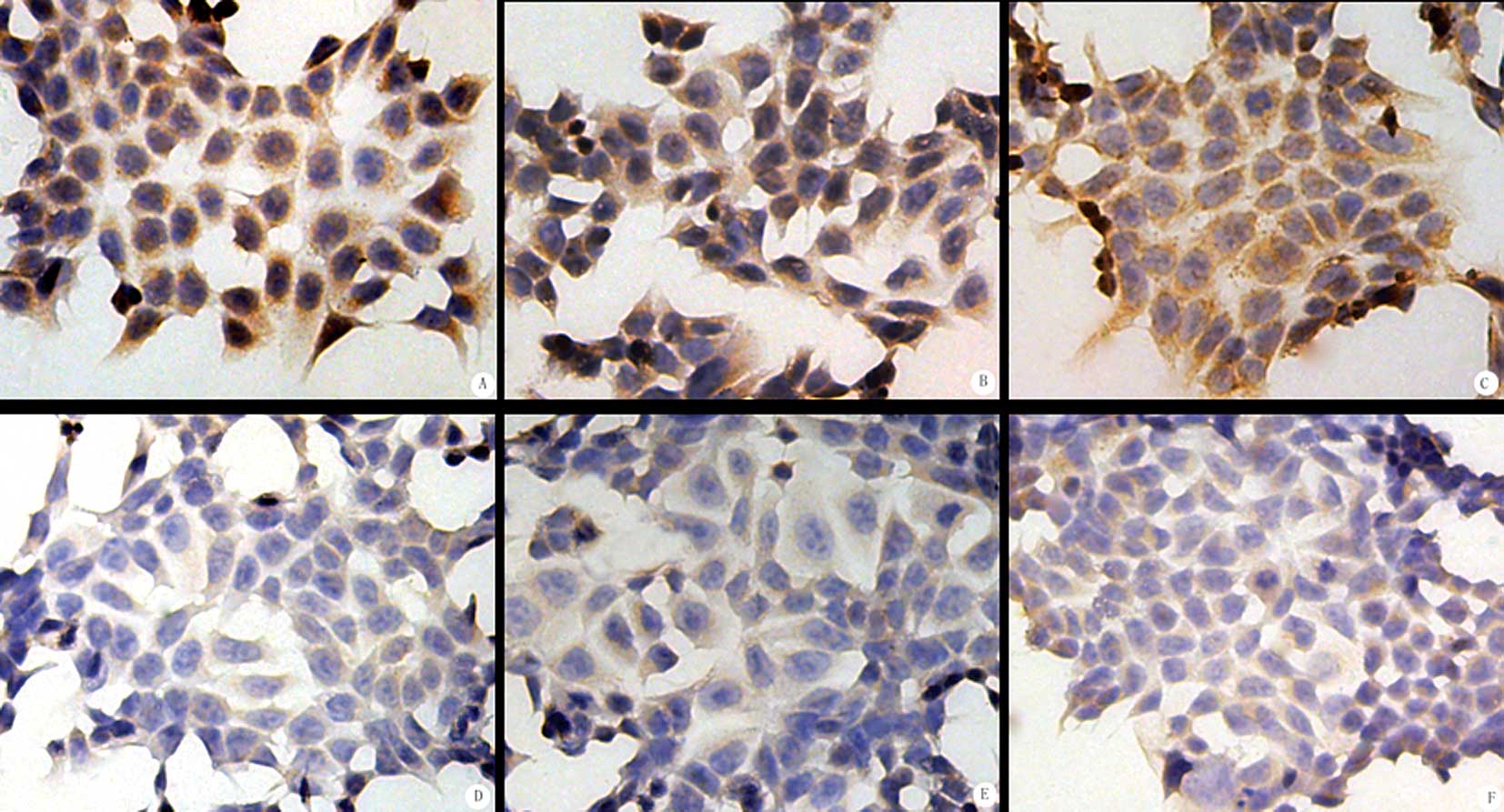|
1.
|
Issemann I and Green S: Activation of a
member of the steroid hormone receptor superfamily by peroxisome
proliferators. Nature. 347:645–650. 1990. View Article : Google Scholar : PubMed/NCBI
|
|
2.
|
Kersten S, Desvergne B and Wahli W: Roles
of PPARs in health and disease. Nature. 40:421–424. 2000.
|
|
3.
|
Mueller E, Smith M, Sarraf P, Kroll T,
Aiyer A, Kaufman DS, Oh W, Demetri G, Figg WD, Zhou XP, Eng C,
Spiegelman BM and Kantoff PW: Effects of ligand activation of
peroxisome proliferator-activated receptor gamma in human prostate
cancer. Proc Natl Acad Sci USA. 97:10990–10995. 2000. View Article : Google Scholar : PubMed/NCBI
|
|
4.
|
Nagamine M, Okumura T, Tanno S, Sawamukai
M, Motomura W, Takahashi N and Kohgo Y: PPARgamma ligand-induced
apoptosis through a p53-dependent mechanism in human gastric cancer
cells. Cancer Sci. 94:338–343. 2003. View Article : Google Scholar : PubMed/NCBI
|
|
5.
|
Heaney AP, Fernando M and Melmed S:
PPAR-gamma receptor ligands: novel therapy for pituitary adenomas.
J Clin Invest. 111:1381–1388. 2003. View Article : Google Scholar : PubMed/NCBI
|
|
6.
|
Yoshimura R, Matsuymma M, Segawa Y, Hase
T, Mitsuhashi M, Tsuchida K, Wada S, Kawahito Y, Sano H and
Nakatani T: Expression of peroxisome proliferator-activated
receptors (PPARs) in human urinary bladder carcinoma and growth
inhibition by its agonists. Int J Cancer. 104:597–602. 2003.
View Article : Google Scholar : PubMed/NCBI
|
|
7.
|
Guan YF, Zhang YH, Breyer RM, Davis L and
Breyer MD: Expression of peroxisome proliferator-activated receptor
gamma (PPARgamma) in human transitional bladder cancer and its role
in inducing cell death. Neoplasia. 1:330–339. 1999. View Article : Google Scholar : PubMed/NCBI
|
|
8.
|
Faueonnet S, Lascombe I, Chabannes E,
Adessi GL, Desvergne B, Wahli W and Bittard H: Differential
regulation of vascular endothelial growth factor expression by
peroxisome proliferator-activated receptors in bladder cancer
cells. J Biol Chem. 277:23534–23543. 2002. View Article : Google Scholar
|
|
9.
|
Elstner E, Williamson EA, Zang C, Fritz J,
Heber D, Fenner M, Possinger K and Koeffler HP: Novel therapeutic
approach: ligands for PPARgamma and retinoid receptors induce
apoptosis in bcl-2-positive human breast cancer cells. Breast
Cancer Res Treat. 74:155–165. 2002. View Article : Google Scholar
|
|
10.
|
Zhou X, Zheng Q, Zhao X and Ma H: The
inhibitory effect of elemene combined with tamoxifen on breast
cancer cell line MCF-7. J Xi’an Jiaotong Univ Med Sci. 28:74–77.
2007.
|
|
11.
|
Chawla A, Schwarz EJ, Dimaculangan DD and
Lazar MA: Peroxisome proliferator activated receptor (PPAR) gamma:
adipose-predominant expression and induction early in adipocyte
differentiation. Endocrinology. 135:798–800. 1994.
|
|
12.
|
Theocharis S, Giaginis C, Parasi A,
Margeli A, Kakisis J, Agapitos E and Kouraklis G: Expression of
peroxisome proliferator-activated receptor-gamma in colon cancer:
correlation with histopathological parameters, cell cycle-related
molecules, and patient survival. Dig Dis Sci. 52:2305–2311. 2007.
View Article : Google Scholar
|
|
13.
|
Elstner E, Muller C, Koshizuka K,
Williamson EA, Park D, Asou H, Shintaku P, Said JW, Heber D and
Koeffler HP: Ligands for peroxisome proliferator-activated receptor
gamma and retinoic acid receptor inhibit growth and induce
apoptosis of human breast cancer cells in vitro and in BNX mice.
Proc Natl Acad Sci USA. 95:8806–8811. 1998. View Article : Google Scholar : PubMed/NCBI
|
|
14.
|
Shimada T, Kojima K, Yoshiura K, Hiraishi
H and Terano A: Characteristics of the peroxisome
proliferator-activated receptor γ (PPARγ) ligand induced apoptosis
in colon cancer cells. Gut. 50:658–664. 2002.
|
|
15.
|
Chang TH and Szabo E: Induction of
differentiation and apoptosis by ligands of peroxisome
proliferator-activated receptor γ in non-small cell lung cancer.
Cancer Res. 60:1129–1138. 2000.
|
|
16.
|
Motomura W, Okumura T, Takahashi N, Obara
T and Kohgo Y: Activation of peroxisome proliferator-activated
receptorγ by troglitazone inhibits cell growth through the
increases of P27kipl in human pancreatic carcinoma cells. Cancer
Res. 60:5558–5564. 2000.
|
|
17.
|
Liu JJ, Liu PQ, Lin DJ, Xiao RZ, Huang M,
Li XD, He Y and Huang RW: Downregulation of cyclooxygenase-2
expression and activation of caspase-3 are involved in peroxisome
proliferator-activated receptor-gamma agonist-induced apoptosis in
human monocyte leukemia cells in vitro. Ann Hematol. 86:173–183.
2007. View Article : Google Scholar
|
|
18.
|
Yoshida K, Tanabe K, Fujii D, Oue N, Yasui
W and Toge T: Induction mechanism of apoptosis by troglitazone
through peroxisome proliferator-activated receptor-gamma in gastric
carcinoma cells. Anticancer Res. 23:267–273. 2003.
|
|
19.
|
Murata H, Kawano S, Tsuji S, Tsuji M,
Sawaoka H, Kimura Y, Shiozaki H and Hori M: Cyclooxygenase-2
overexpression enhances lymphatic invasion and metastasis in human
gastric carcinoma. Am J Gastroenterol. 94:451–460. 1999. View Article : Google Scholar : PubMed/NCBI
|
|
20.
|
Yoshimoto M, Itoh F, Yamamoto H, Hinoda Y,
Imai K and Yachi A: Expression of MMP-7 mRNA in human colorectal
cancers. Int J Cancer. 54:614–619. 1993. View Article : Google Scholar : PubMed/NCBI
|
|
21.
|
McDonnell S, Naver M, Coffey RJ Jr and
Matrisian LM: Expression and localization of the matrix
metalloproteinase pump21 (MMP-7) in human gastric and colon
carcinomas. Mol Carcinog. 4:527–536. 1991. View Article : Google Scholar : PubMed/NCBI
|
|
22.
|
Baker AH, George SJ, Zaltsman AB, Murphy G
and Newby AC: Inhibition of invasion and induction of apoptotic
cell death of cancer cell lines by over-expression of TIMP-3. Br J
Cancer. 79:1347–1355. 1999. View Article : Google Scholar : PubMed/NCBI
|

















